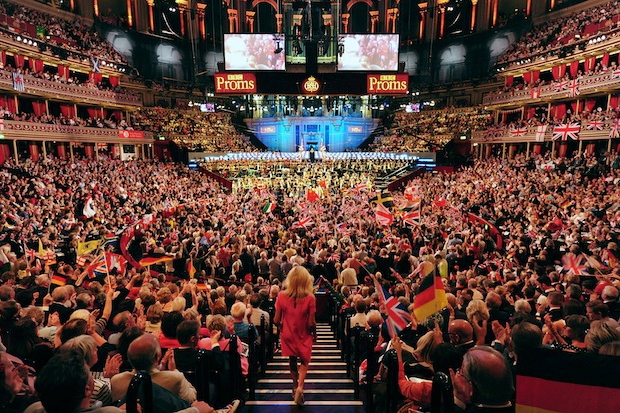This year the Proms are to stage 21 world premières and 11 European, UK or London premières. It is good to see the corporation continuing its mission to encourage new music, though some think they overdo it. I heard one of our leading keyboard players say that when he was asked to première a piece recently, he replied that he would rather dernière it. Clearly the BBC takes a more hopeful view.
The most eye-catching new work in the series, leaving Whitacre out of it for now, will surely be the Fourth Symphony of our latest musical knight, Sir James MacMillan. MacMillan has described the piece as ‘abstract’ and ‘infused by ritual’, with allusions to the music of his great (arguably greatest) Scottish predecessor, the renaissance composer Robert Carver. Carver was remarkable in his day for writing textures that require very large ensembles, including the 19-part motet O bone Jesu. MacMillan seems to have contented himself with calling on the merely ten-voice Missa Dum sacrum mysterium, whose contours we may hear in some of the string parts. He says that the references feel ‘quite distant …like a subliminal message’. The idea of ‘Carver meets the symphony orchestra’ is appealing.
Michael Finnissy’s Janne takes inspiration from another composer, though in the case of Sibelius the symphony orchestra was already bread and butter. The genesis of this commission is intriguing: Finnissy wanted to ‘wrestle with the Sibelian way of writing’ hoping that ‘it might be fun to do an imaginary portrait of the child Sibelius, violin in hand, wondering what he was going to be when he grew up.’ He says that the result is like a painting by Barnett Newman, a piece of abstract expressionism in a number of panels, each containing one basic type of texture and music that continues throughout that panel.
But in case we should think this has all become an exercise in insularity, the BBC has also co-commissioned Luca Francesconi’s Second Violin Concerto, in collaboration with the Swedish Radio SO and the RAI National SO. The performance, on 27 July, will be its UK première. Francesconi has found inspiration in what Lorca called duende – a state of excitement that ‘surges up inside, from the soles of the feet’. Francesconi says, ‘If you don’t feel overexcited, if you don’t feel in another state when you compose a piece of music, you won’t be able to make the audience feel the same state of alteration.’ Shiori Usui is nearer to home these days, though she didn’t come to the UK from her native Japan until she was 17. Her Proms commission is entitled Ophiocordyceps unilateralis s.l., which in nature is a fungal parasite. Her music begins with the image of a dead ant that has succumbed to this parasite. Such unusual sources of inspiration are normal for Usui: her compositions have previously been described as ‘music of the hospital ward’. Intrigued? The première is on 25 July.
Whether Eric Whitacre can be considered local or not isn’t very important — he has moved permanently to London from Los Angeles — though if he had been born here he would surely have got a gong of some kind by now, assuming these things are designed to celebrate the global reach of national endeavour. The rise and rise of Whitacre is one of the most remarkable stories in classical music today. He hasn’t written very much, and is said to write slowly, but just about every piece he has written has become well known. He himself has also become highly recognisable. Not long ago he was modelling expensive luggage, evidence of which we found recently in those larger-than-life publicity installations in Heathrow. His wholesome looks and unfailing politeness are the ideal ingredients for his most famous creation, the Virtual Choir where, in the latest version, he virtually directs 8,409 videos from 5,905 people in 101 different countries. You could join in — all you need is a phone, access to the online score of the featured piece, and something of a voice. In fact, not even that.
Building on this phenomenon, the Proms have co-commissioned Deep Field. Whitacre hopes this composition will convey the ‘wonder and awe’ he felt when he first saw the images captured from deep space by the Hubble Telescope in 1990. But he doesn’t stop there. ‘As the piece nears the end …I’ll turn to the audience, give a downbeat, and invite them to participate using their mobile phones, recreating the spectra of the Deep Field image.’ The ivory tower is not for Eric.






Comments